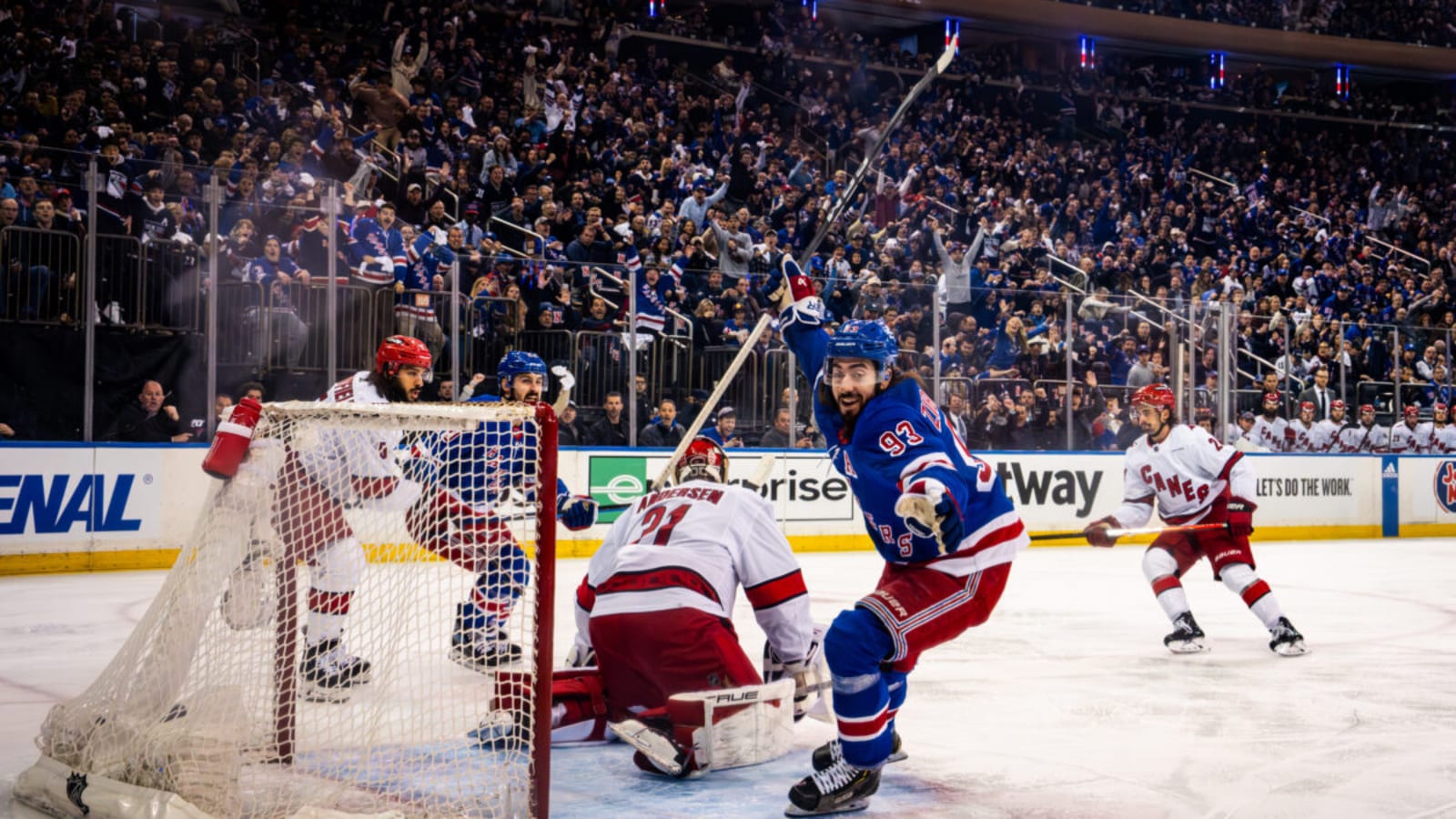
Earlier this month, the Chicago Blackhawks writing team here at The Hockey Writers were presented with a potential trade scenario by a colleague. To the Blackhawks: Mika Zibanejad with the New York Rangers retaining $1.7 million of his $8.5 million contract and a second-round pick. To the Rangers: Future considerations. This hypothetical was first proposed by Arthur Staple at The Athletic (from ‘What would an ideal Rangers offseason look like? And a nightmare one?,’ The Athletic, May 2025).
When I first heard this, I thought, “Thank you, but no thank you.” I was also curious how my colleagues would respond in case I missed some potential upside. To my pleasant surprise, everyone agreed: Keep Zibanejad. We don’t want him.
This prompted a remark from the individual who shared the scenario with us and shall remain anonymous (his name rhymes with Schark Meig), “Seems the Blackhawks are viewed as the dumping ground still.”
Ouch. The words that cut deepest are the ones that ring most true, and Mark’s comment carried some weight. Over the past few years, the Blackhawks have signed older players with large cap hits, being forced to take on “dead weight” contracts to meet the cap floor. Given the team’s recent history, it’s perfectly reasonable to choose the Blackhawks as the trade partner for Zibanejad. But our writing team’s resounding “No!” encouraged me. Something has shifted both in the front office and the fanbase’s minds.
Blackhawks’ Rough Years
In March, the Blackhawks acquired retired Hall of Fame defenseman Shea Weber’s contract from the Utah Mammoth. His $7.857 million deal ensured the team met the $70.6 million salary floor imposed by the NHL. It’s a necessary move, but it didn’t breed confidence in the team’s competitiveness. Competitive teams aren’t trying to meet the cap floor.
These are the natural consequences of a rebuild, and that rebuild frames every decision management makes. Heading into the 2024-25 season, the team signed TJ Brodie ($3.75 million), Pat Maroon ($1.3 million), Alec Martinez ($4 million), and Ilya Mikheyev ($4.037 million). The Blackhawks wanted veteran players to round out the roster, and the team could afford these types of contracts. I understand. But every player listed here is 30 or older. Two retired (Maroon and Martinez), one will most likely retire (Brodie), and Mikheyev will continue to move down the depth chart as younger talent blossoms.
turns out, Frank Nazar’s feet don’t even have to be touching the ice for him to score a goal
— Blackhawks on CHSN (@CHSN_Blackhawks) May 18, 2025: @usahockey pic.twitter.com/MQb3t3MdIs
More to the point, these acquisitions also signaled to the rest of the league that the Blackhawks were willing and able to take players and contracts that had become burdensome. That’s why the team retained $4.625 million of Mikko Rantanen’s contract when the Colorado Avalanche traded him to the Carolina Hurricanes. The Blackhawks also burned one of three retention slots when Seth Jones was moved to the Florida Panthers.
There are other examples: Josh Bailey from the New York Islanders in 2023 and Jake McCabe to the Toronto Maple Leafs that same year. For years now, the Blackhawks have been the first team that comes to mind when numbers are tight, and a contract needs to be moved.
Something Has Changed in Chicago
I concede that the Blackhawks team here at The Hockey Writers is a small sample size, but I’d argue we admirably and accurately represent the general disposition of the fanbase. So, when we say we don’t want Zibanejad, I think most would agree. But why don’t we want him?
The Blackhawks don’t want to be the dumping ground for the NHL anymore. Sure, the rebuild is still underway, but the team has taken significant strides forward. The focus is no longer on surrounding the young talent with veterans. The time has come for the young players—Connor Bedard, Frank Nazar, and Sam Rinzel—to step into leadership roles with the support of seasoned professionals. That’s what general manager Kyle Davidson reiterated after hiring Jeff Blashill as the next head coach:
[Blashill’s] thrived when in a position to develop young players and has shown he’s capable of blending that into overall team success, a vision and philosophy we share for where we are today and where we see our team in the future.
Players like Zibanejad don’t fit into that vision or philosophy, especially when the Blackhawks have leadership figures like captain Nick Foligno. It’s a subtle departure from years of acquiescence to the rebuild. The organization is no longer concerned with the future, allowing player and contract dumps to be swallowed with a sour taste. The focus is the present, and if a player or coach isn’t going to help the team now, respectfully keep him.
Encouraging Signs for Blackhawks
I’ve ended my recent pieces with a similar sentiment: these are encouraging signs. Whether it be draft priorities or player development, the Blackhawks aren’t in the same phase of the rebuild they were in at the beginning of last season or the year before. This fun hypothetical with Zibanejad only underscores that further.
More must-reads:
- David Kampf quickly finds new team after Maple Leafs saga
- Devils' Jack Hughes will be out longer than expected after bizarre injury
- The 'NHL all-time goal leaders' quiz
Breaking News
Trending News
Customize Your Newsletter
 +
+
Get the latest news and rumors, customized to your favorite sports and teams. Emailed daily. Always free!









